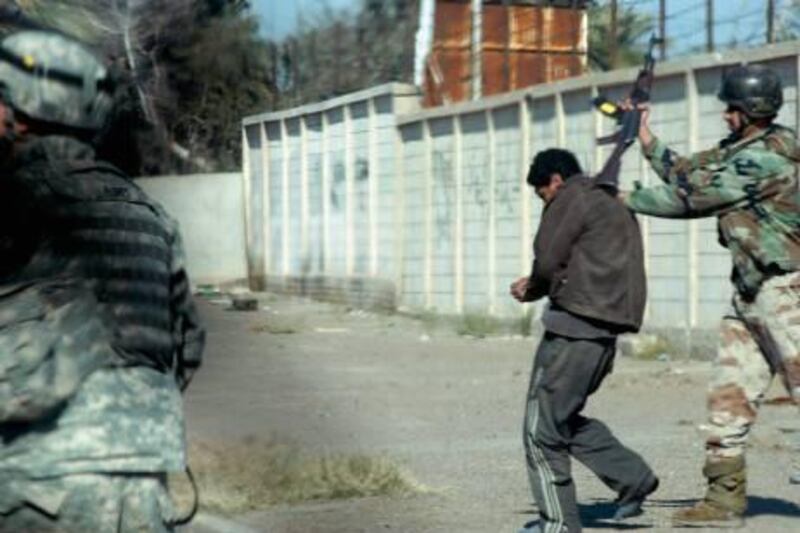WASHINGTON // The WikiLeaks founder Julian Assange yesterday defended the decision by the website to publish nearly 400,000 classified US military documents as an effort to reveal the truth about the war in Iraq.
A spokesman for the site, meanwhile, promised that another batch of 15,000 files on the war in Afghanistan would soon be released.
"This disclosure is about the truth," Mr Assange said at a news conference in London. "The attack on the truth by war begins long before war starts and continues long after a war ends."
The publication Friday of the 391,832 reports, billed as the largest ever leak of classified military documents, was denounced by the US military as "shameful". A Pentagon spokesman said the leak would endanger American troops in Iraq.
"This is an extraordinary disservice to America's men and women in uniform," Geoff Morrell, the Pentagon's press secretary, said late Friday.
The more than 150,000 US forces in Iraq and Afghanistan are already in considerable danger, he said, and that "danger is now exponentially multiplied … because [the leak] gives our enemies the wherewithal to look for vulnerabilities in how we operate and to exploit those opportunities".
The files indicate that 285,000 casualties were recorded between 2004 and 2009, including 109,032 violent deaths. Of those, 66,081, or more than 60 per cent, were civilians, 23,984 were "enemy", 15,196 were members of the Iraqi security forces, and 3,771 were US and allied soldiers. The numbers, said WikiLeaks, show the Iraq war to have been five times as lethal as the war in Afghanistan.
The logs document the killing of as many as 681 civilians at US checkpoints. Improvised explosive devices placed by insurgents killed 31,780 civilians and soldiers. The reports also record numerous instances of torture by Iraqi security forces of detainees that US troops often ignored.
The revelations have caused the UN and human rights groups to call on the US administration to investigate possible violations of international conventions on torture.
The New York-based Human Rights Watch issued a statement reiterating its concern that "US authorities committed a serious breach of international law when they summarily handed over thousands of detainees to Iraqi security forces who, they knew, were continuing to torture and abuse detainees on a truly shocking scale".
Manfred Nowak, the UN's chief investigator on torture, yesterday told the BBC that if "authorities hand over detainees knowing there is a serious risk of them being subjected to torture, they violate article 3 of the UN convention that precludes torture".
If Iraqi security forces are found to have abused detainees with the knowledge of the American military, the US would be in contravention of those conventions, Mr Nowak said. He added that a failure to investigate would be a failure to recognize US obligations to international law, Mr Nowak said.
The Pentagon rejected accusations of human rights violations and defended its record on civilian deaths.
"It has been a driving force for us, a guiding principle for us over the last seven years of this conflict to do everything in our power - perhaps more than any other military in the history of the world has ever done - to minimize civilian casualties," the Pentagon said in a statement Friday.
The Pentagon has established a 120-man strong task force to deal with the release, which was first reported last week, and the military was keen to focus on the potential danger of the leak to US forces.
"Potentially what one could mine from a huge data base like this are vulnerabilities in terms of how we operate, our tactics, our techniques, our procedures, the capabilities of our equipment, how we respond in combat situations, response times - indeed how we cultivate sources," Mr Morrell said.
When WikiLeaks posted 70,000 documents related to the war in Afghanistan in July, the Pentagon suggested the same dangers applied. Two weeks ago, however, Robert Gates, the US defence secretary, acknowledged that the first leak had not disclosed any sensitive intelligence sources or methods.
Scott Stewart, an intelligence analyst with Stratfor, a Texas-based think tank, said the nature of the Iraq documents was likely similar.
The leak "is significant, but none of the stuff we saw last time [with the Afghan document leak] was really sensitive source-reporting type material," said Mr Stewart, who spoke before the Iraq documents were released. "As far as we know, this latest batch of material will not be any different in nature."
Mr Stewart said the very reason the leak had likely happened - that the information contained in the documents had already been widely disseminated electronically across the US military and security system - also suggested that the material was "low-level".
A Virginia-based military analyst, Bradley Manning, 22, is under arrest and charged with being the source of the leaks.
[ okarmi@thenational.ae ]






